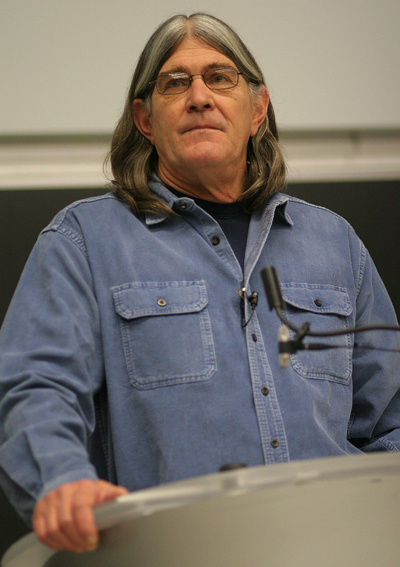
American Indian activist Ward Churchill, known for his controversial remarks about Sept. 11 victims, spoke at Binghamton University Saturday about what he called a United States-led genocide of natives and land theft during the colonization of North America ‘ a policy that plagues the surviving American Indian population to this day.
Over 300 students, faculty and community members gathered in Lecture Hall 1 to hear Churchill, a professor of ethnic studies at the University of Colorado at Boulder, give a lecture titled ‘Indigenous Right and Resistance,’ sponsored by the Graduate Student Organization.
Although recognized for his numerous writings on American Indians, Churchill attracted nationwide attention in 2005 with his essay on the Sept. 11 attacks in which he argued that the United States provoked the attacks with its foreign policy.
The essay questioned the innocence of the victims, comparing their involvement in U.S. policies to that of Adolf Eichmann in organizing the Holocaust.
‘A whole bunch of people in N.Y. state got pissed at me,’ Churchill said. ‘In their mind I have compounded their loss by demeaning their dead.’
Churchill received death threats because of his analysis and was asked to comment on the controversy during the question and answer session following the lecture.
‘I made one crucial error in that [essay],’ Churchill said. ‘I figured that the average, well-educated American knew who Eichmann was, and he didn’t.’
Eichmann was a technician in the Schutzstaffel (SS), Churchill explained; he did not kill or give orders to kill Jews.
‘What was horrifying about Eichmann was [that he] sat at a desk and pushed paper, in full knowledge that what he was doing would translate into murder of millions,’ Churchill said, ‘which is exactly what you do when you work for Cantor Fitzgerald.’
Churchill added that he wrote the paper in reaction to the media coverage of the event, who kept calling the act senseless and the victims innocent.
‘As if being an American translates into being innocent,’ Churchill said. ‘And how can you possibly know it was senseless?’
Churchill described al-Qaida’s justification for the attacks: the occupation of Palestine and the U.S. sanction of Iraq in the ’90s ‘ which caused 500,000 deaths.
Throughout the lecture, Churchill talked about the atrocities American Indians suffered as a result of U.S. colonial policies.
He began his speech by pointing out that BU officially belongs to American Indians and that he was therefore giving his lecture on occupied territory.
‘The entire northern half of New York has never been ceded to the government,’ Churchill said, ‘not a treaty, not an agreement, not a 199-year lease ‘ nothing. This is someone else’s land and it’s being used to the benefit of another population, to the detriment of the actual owners.’
According to federal records, about one-third of U.S. territory has not been relinquished by a treaty, Churchill said, and still legally belongs to American Indians.
Churchill also discussed the extermination of American Indians during colonization.
Many audience members gasped when Churchill said that the government encouraged slaughter and paid for each dead American Indian.
He said that a bounty was paid for a proof of death ‘ usually in the form of a scalp ‘ of any American Indian, including a fetus. The bounty for a dead male was equivalent to an annual wage of a Pennsylvania farmer.
Genocide was U.S. policy, Churchill said, because ‘you cannot impose and maintain colonial domination over any people anywhere other than by commission of genocide.’
Churchill added that the consequences of these policies for the American Indians are atrocious. Over 97 percent of native population has been wiped out and the few that live on reservations today are very poor.
‘Indians’ minerals have been mined, land has been used, water gets utilized, timber gets cut, salmon picked out,’ Churchill said. ‘As a population Indians are among the poorest. We’re talking third-world impoverishment.’
Churchill added that 10 years ago the average life expectancy of an American Indian was 44.6 years, while that of the general population was 70.8 years.
The audience was very receptive to Churchill, giving him a standing ovation when he concluded.
‘A lot of this struck a chord with me,’ said Kelsey Leljedal, an undecided freshman. ‘He did a very good job. [The lecture] really made me think.’


